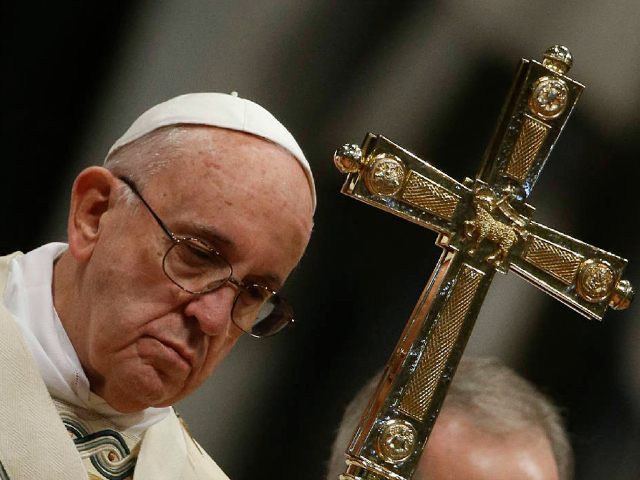In his most biting condemnation yet of the jihadists of the Islamic State, Pope Francis told members of the international diplomatic corps in the Vatican Monday that every true religion promotes peace, and by contrast, religious extremists who kill in God’s name—such as the Islamic Caliphate—are a perversion of real religion.
“One may never kill in the name of God,” Francis declared. “Only a distorted ideological form of religion can think that justice is done in the name of the Almighty by deliberately slaughtering defenseless persons, as in the brutal terrorist attacks which occurred in recent months in Africa, Europe and the Middle East.”
Referencing the recent celebration of Christmas, the Pope said that the “mystery of the Incarnation shows us the real face of God, for whom power does not mean force or destruction but love, and for whom justice is not vengeance but mercy.”
Francis reiterated an expression he used during his recent visit to the Central African Republic, noting that “where God’s name has been misused to perpetrate injustice,” it is essential to proclaim that “those who claim to believe in God must also be men and women of peace.”
The Pope’s words stand in stark contrast to news coming out of the Islamic State, such as two recent “religious” rulings, one of which authorized the slaughter of children born with disabilities and the other regulating the correct way to rape female captives. Moreover, last week ended with the news of a young jihadi who killed his mother in cold blood because she opposed his membership in the Islamic State, shooting her in the head before a crowd of hundreds of onlookers.
In Monday’s address, the Pope also lamented the forced exodus of Christians from the Middle East, reaching out to the “many Christians who in great numbers have abandoned their native lands these past years, despite the fact that they have dwelt there from the earliest days of Christianity.”
The Pope said that so many Christians “would readily return to their own country, if only there they could find adequate conditions of security and sustenance,” noting that the Christians of the Middle East “desire to contribute fully as citizens to the spiritual and material well-being of their respective nations.”
Offering what was perhaps his most thoughtful and nuanced analysis of Europe’s migrant crisis to date, Francis recognized that “the massive number of arrivals on the shores of Europe appear to be overburdening the system of reception.”
“Given the immense influx and the inevitable problems it creates,” he noted, “a number of questions have been raised about the real possibilities for accepting and accommodating people, about changes in the cultural and social structures of the receiving countries, and about the reshaping of certain regional geopolitical balances.”
“Equally significant,” he acknowledged, “are fears about security, further exacerbated by the growing threat of international terrorism.”
In an attempt to address these deep concerns, while still affirming the need to find a long-term solution to the crisis, Francis said he was convinced that Europe “has the means to defend the centrality of the human person and to find the right balance between its twofold moral responsibility to protect the rights of its citizens and to ensure assistance and acceptance to migrants.”
In a sharp rebuke to post-Christian Europe, the Pope argued that “extremism and fundamentalism find fertile soil not only in the exploitation of religion for purposes of power, but also in the vacuum of ideals and the loss of identity — including religious identity — which dramatically marks the so-called West.”
Follow Thomas D. Williams on Twitter @tdwilliamsrome.

COMMENTS
Please let us know if you're having issues with commenting.